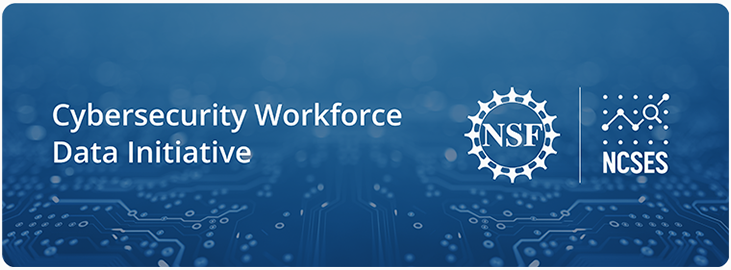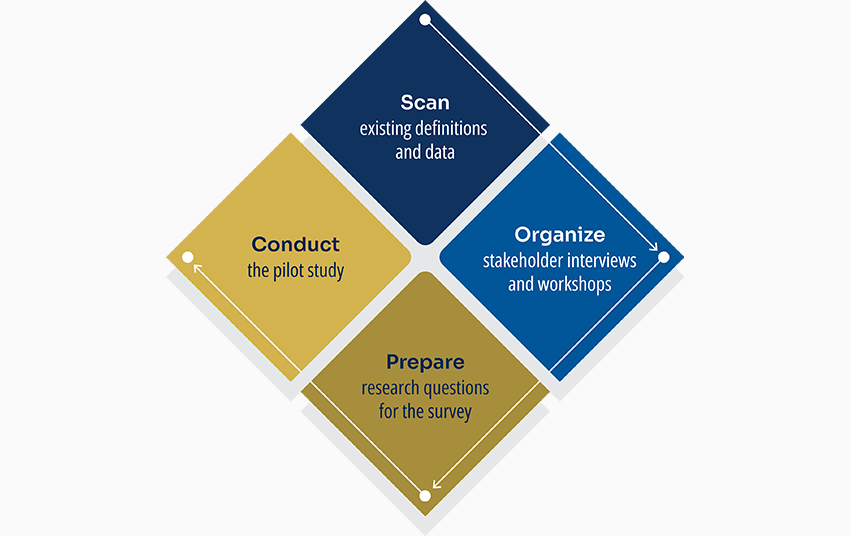
Introduction
The Cybersecurity Workforce Data Initiative (CWDI) exists to assess the feasibility of producing national estimates and statistical information on the cybersecurity workforce as mandated by Public Law (P.L.) 117-167. The National Center for Science and Engineering Statistics, the federal statistical agency within the U.S. National Science Foundation (NSF), is leading the work in collaboration with their contractor RTI International to describe the cybersecurity workforce, which includes individuals trained and educated in cybersecurity and working in the cybersecurity field in the United States.
Cybersecurity is considered a critical part of national security and the larger national workforce. In addition to NSF, the Department of Defense, the White House, the Office of Management and Budget (OMB), and the National Institute of Standards and Technology (NIST) all have initiatives related to the importance of cybersecurity and developing the cybersecurity workforce. The discipline, workforce, and practice of cybersecurity continue to evolve rapidly, presenting challenges for those who seek to measure and understand a field that has become central to our national security. To better understand the cybersecurity workforce, including who is in the cybersecurity workforce, what those individuals do, and how they are trained, the CWDI has several stages:
Cybersecurity is considered a critical part of national security and the larger national workforce. In addition to NSF, the Department of Defense, the White House, the Office of Management and Budget (OMB), and the National Institute of Standards and Technology (NIST) all have initiatives related to the importance of cybersecurity and developing the cybersecurity workforce. The discipline, workforce, and practice of cybersecurity continue to evolve rapidly, presenting challenges for those who seek to measure and understand a field that has become central to our national security. To better understand the cybersecurity workforce, including who is in the cybersecurity workforce, what those individuals do, and how they are trained, the CWDI has several stages:

Each stage of the CWDI is explained in more detail below. As these activities progress, updates will be posted to this page.
Authorizing Legislation
P.L. 117-167 authorized NSF in coordination with the Director of NIST and other appropriate federal statistical agencies to establish a CWDI that
- Assesses the feasibility of providing nationally representative estimates and statistical information on the cybersecurity workforce;
- Utilizes the National Initiative for Cybersecurity Education (NICE) Cybersecurity Workforce Framework (NIST Special Publication 800–181) or other frameworks, as appropriate, to enable a consistent measurement of the cybersecurity workforce;
- Utilizes and complements existing data on employer requirements and unfilled positions in the cybersecurity workforce;
- Consults key stakeholders and the broader community of practice in cybersecurity workforce development to determine data requirements needed to strengthen the cybersecurity workforce;
- Evaluates existing federal survey data for information pertinent to developing national estimates of the cybersecurity workforce;
- Evaluates administrative data and other supplementary data sources, as available, to describe and measure the cybersecurity workforce; and
- Collects statistical data, to the greatest extent practicable, on credential attainment and employment outcomes information for the cybersecurity workforce
Project Stages
Please come back to the Project Stages section for updates as these activities progress.
1. Scan existing definitions and data
As a first step of the CWDI, a comprehensive landscape scan was conducted. Activities included
- Evaluating existing cybersecurity workforce definitions (598 KB)
- Assessing cybersecurity workforce supply and demand (783 KB)
- Evaluating existing federal survey data related to the cybersecurity workforce (870 KB)
- Exploring existing administrative data or other supplementary data sources related to the cybersecurity workforce (1.1 MB)
These activities took place between fall 2023 and summer 2024.
2. Organize stakeholder interviews and workshops
As a second step of the CWDI, 30 stakeholder interviews were conducted from January to April 2024. Half of the interviews were focused on gathering information on the types of professionals included in the cybersecurity workforce. The other half were focused on current information gaps and needs in cybersecurity workforce data. Additionally, three workshops were held on important topics related to cybersecurity workforce data in May and June 2024. These workshops were open to the public and used for information gatherings to inform future cybersecurity workforce data collection.
To learn more about the CWDI workshops, please click below.
To learn more about the CWDI workshops, please click below.
3. Prepare research questions for the survey
In the latter half of 2024, the following activities that were built on Project States 1 and 2 were accomplished:
- Developed research questions to inform the CWDI of the recommendations for potential items for a pilot survey
- Developed a draft survey questionnaire for the CWDI pilot study with a focus on the U.S. cybersecurity workforce; this questionnaire addresses the knowledge gaps identified in prior stages of the CWDI
- Started to plan for testing the draft survey questionnaire, and for obtaining generic OMB clearance for questionnaire testing
- Summarized all background work that occurred between fall 2023 and 2024 (1.5 MB) , which is the basis for the next steps
4. Conduct the pilot study
As a final step of the CWDI, a pilot survey will be conducted to collect information on the cybersecurity workforce. This pilot will be informed by earlier study activities, such as the testing of survey questions and the evaluation of existing data sources to maximize the utility of the study to future data users. The pilot survey will be used to inform potential future full-scale CWDI data collection.
Contact Information
CWDI
 An official website of the United States government
An official website of the United States government

